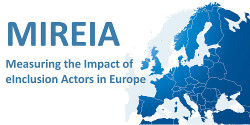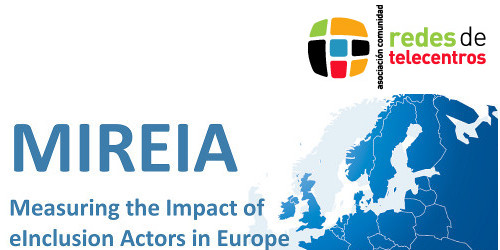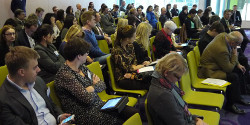
16 Oct MIREIA – Measuring the Impact of eInclusion Actors
16 Oct, 2012
Objectives
JRC-IPTS and DG CONNECT conducted the MIREIA project, which aimed to better understand the role of eInclusion intermediary actors and to create adequate instruments to show how they contribute to the achievement of European eInclusion policy goals. In concrete, the objectives of the study were to:
- Characterise and map eInclusion intermediary actors in Europe in order to know better what eInclusion intermediary actors are, which services they provide, to which targets groups, how they operate and innovate and how they can be classified.
- Build and test an impact assessment framework that will allow to systematically collect end-users micro-data through grassroots organisations and aggregate it at various levels, in order to facilitate the measurement of outcomes and the estimation of the impact of those actors on employment, education and social inclusion.
Activities
Within the framework of MIREIA, the JRC-IPTS appointed three experts to carry out analyses to provide a detailed picture of the eInclusion Intermediaries local landscape (Locality Mapping) in three areas selected for their diversity and possible representativeness of the European context: El Raval-Barcelona (Spain), Zemgale (Latvia) and Sunderland (United Kingdom).
The results of the Locality mapping also served as an input to conduct the Mapping of eInclusion Actors in Europe. For this purpose, the JRC-IPTS commissioned Telecentre-Europe to implement an online survey to provide a ‘map’ of eInclusion actors operating in the 27 EU Member States. Relevant data and documentation have been gathered to illustrate the diverse typologies, activities and role of key eInclusion intermediaries at European level.
This exercise and its outcomes aimed to help the eInclusion sector to leverage its resources and provide vital insights for policy makers to understand the importance of eInclusion organisations that are on the forefront of digital inclusion and empowerment.
Publications
- Report: Literature Review of theories and explanations on the value and impact of eInclusion interventions and their dynamics.
- Locality Mapping in 3 selected areas: August- November 2012.
- Mapping eInclusion Intermediaries in El Raval-Barcelona (Spain)
- Mapping eInclusion Intermediaries in Zemgale (Latvia)
- Mapping eInclusion Intermediaries in Sunderland (UK)
- Survey on eInclusion Actors in EU27
- Dataset of the online Survey on eInclusion Actors eInclusion Actors Online Survey in EU27: 2 January to 28 February 2013
Past events
- Presentation of MIREIA at the High Level Conference on eGovernment organised by the Lithuanian Presidency of the EU Council. 14th November 2013
- Presentation of MIREIA at the 6th Telecentre-Europe Annual Summit, 24-25th October 2013 in Malta.
- Presentation of MIREIA Survey preliminary results at the 5th European Congress on e-Inclusion: ECEI13, 3rd October 2013, Brussels.
- Video of Gianluca Misuraca at the conference
- Presentation of MIREIA and 3rd Experts’ Workshop at the Spark Conference- 4th Global Forum on Telecentres: 28-29 May 2013 (Granada, Spain)
- Presentation of MIREIA and workshop at the Telecentre-Europe Summit: 17-18 October 2012 (Warsaw, Poland).
- 2nd Experts’ Workshop: 6th September 2012 (JRC-IPTS, Seville, Spain).
- 1st Experts’ Workshop: 3-4 May 2012 (JRC-IPTS, Seville, Spain).



